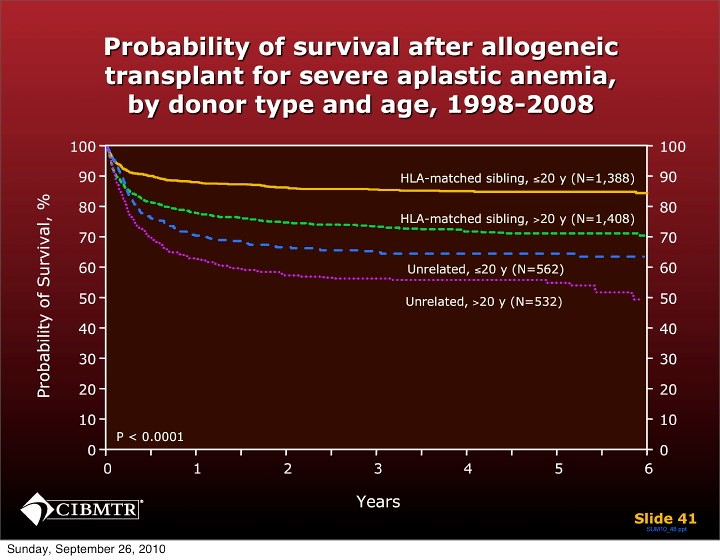
| Home Forums |
|
#1
|
|||
|
|||
|
Very Severe AA
Hi all!
I was diagnosed with Very Severe AA September 2011. I am 51 days into treatment with Horse ATg. I require near weekly platelets and red blood every ten days or so. My ANC has risen slowly to the 800's with a WBC hovering from 2.1 to 2.6. I appreciate all the info here and will share my story as things progress. I am praying the ATg works as I have no related marrow donor. My docs do tell me there are plenty of MUD donors for me but are very concerned about going that route. Does anyone have any data on otherwise healthy patients receiving Bone Marrow transplants? I am 30 yrs old and in good overall physical health. I'd like to see what the data is on VSAA patients who are otherwise healthy in regards to transplants. Thanks for your time!
__________________
Husband; Father of 2;Diagnosed with vsAA 8/25/11; hATG 9/6/11; 12/12 MUD BMT 3/23/12; Follow my journey at https://www.facebook.com/MyNewBirthday San Antonio TX |
|
#2
|
|||
|
|||
|
Hi kjraimondi. I'm glad that your ATG treatment seems to be working, even if it's working slowly.
It's good news that you have matched unrelated donors, so you have that as a backup choice. Being healthy, other than having SAA, makes you a much better candidate for a successful transplant than someone with other health problems, but ATG is the first choice for adults because it has a good success rate, can be repeated, and is less risky than a transplant. In general, the younger you are, the better the rate of success for transplants. Transplants may even be preferred for the youngest patients and they tend to go well for teens too. Transplants for people age 50, 60, 70 are riskier. Age 30 is in the middle. If by "data" you mean survival statistics, the National Marrow Donor Program keeps statistics on SAA transplant survival rates, but you have to use their stats with a large grain of salt, both because it covers patients who may have other health conditions, patients who are younger or older, and because it covers older data. Improvements in pre-transplant care, the transplant process, and post-transplant care continue to increase the odds of success each year, so older data always paints a less optimistic picture than if we had the latest statistics. With that caveat, here is a chart (from this page) showing 70% one-year survival and 60% 5-year survival over all unrelated-donor transplants for SAA in the range from 12 years ago to 3 years ago. Being otherwise healthy puts you in a better-than-average category but I haven't seen any statistics on how that affects SAA transplant outcomes. The NMDP also has transplant statistics by transplant center. For example, you can look up the fact that the M.D. Anderson Cancer Center at the University of Texas did 4 unrelated donor transplants for SAA from 2004 to 2008 and all 4 had survived at 1 year (the only interval they reported). Even if it's too soon to think that you need a transplant, I think it's a smart move that you are asking questions and learning about it, so you'll be well-informed and have the most realistic idea about what your choices are. |
|
#3
|
|||
|
|||
|
Howdy San Antonio!
There's an outfit called the Center for International Blood and Marrow Transplant Research that collects and publishes data on this sort of thing. Here's their most recent slide on survival after transplant for AA: [IMG]  CIBMTR Survival AA by hankins.greg, on Flickr[/IMG] You can go download their whole slide set here. The AA&MDS folks had a session on transplant for AA With Dr. Joachim Deeg of the Fred Hutchinson Cancer Center out in Seattle. He shares some data that you would probably find useful. You'll find that one here. There's another one on down the list on that page by Dr. Matt Kalaycio of the Cleveland Clinic that I always recommend to folks. It's about transplant for MDS, but Kalaycio is a real straight shooter on the risks of transplant. There are also some good presentations on transplant in this set. Good luck! Keep asking question here on marrowforums. There are plenty of folks around with AA and plenty who've had transplants for AA at a variety of ages. Greg
__________________
Greg, 59, dx MDS RCMD Int-1 03/10, 8+ & Dup1(q21q31). NIH Campath 11/2010. Non-responder. Tiny telomeres. TERT mutation. Danazol at NIH 12/11. TX independent 7/12. Pancreatitis 4/15. 15% blasts 4/16. DX RAEB-2. Beginning Vidaza to prep for MUD STC. Check out my blog at www.greghankins.com |
|
#4
|
|||
|
|||
|
Thanks for the information! I really appreciate it. I will keep the forum informed on how my treatment progresses. God bless you all!

__________________
Husband; Father of 2;Diagnosed with vsAA 8/25/11; hATG 9/6/11; 12/12 MUD BMT 3/23/12; Follow my journey at https://www.facebook.com/MyNewBirthday San Antonio TX |
 |
| Thread Tools | Search this Thread |
|
|
 Similar Threads
Similar Threads
|
||||
| Thread | Thread Starter | Forum | Replies | Last Post |
| 25 years after AA, now I've got AA and PNH | squirrellypoo | Tell Your Story | 14 | Fri Dec 14, 2018 11:52 AM |
| severe AA -partila remission and left upper quadrant abdominal pain | Ellen McDonough | AA | 1 | Tue Feb 28, 2012 10:10 PM |
| AA for 25 yrs now Severe MDS | ajaeger | MDS | 2 | Thu Dec 8, 2011 07:32 AM |
| How Does AA Progress to MDS? | Greg H | AA | 10 | Fri Sep 9, 2011 07:00 AM |
| I've had severe AA for past 3 years | Barbara2007 | AA | 12 | Fri Nov 16, 2007 11:15 PM |